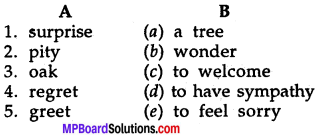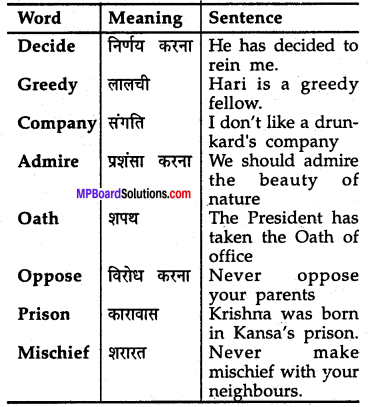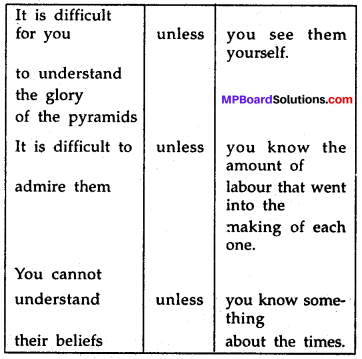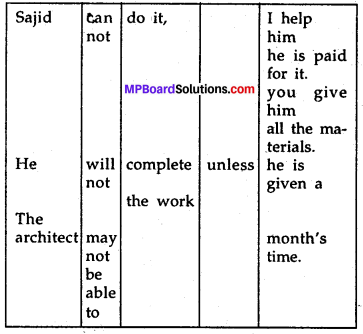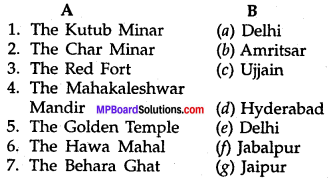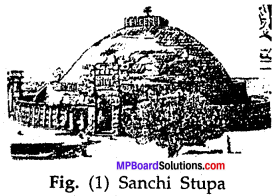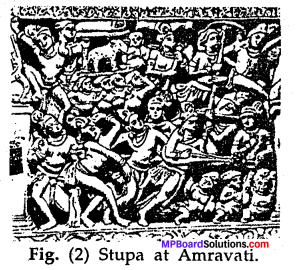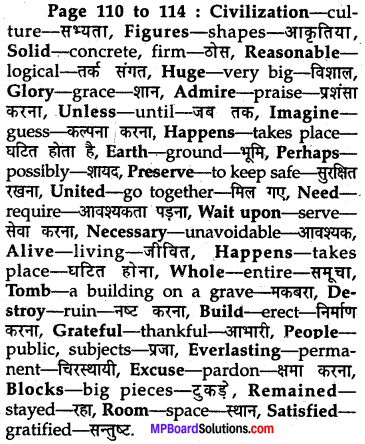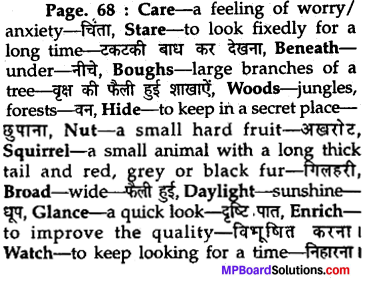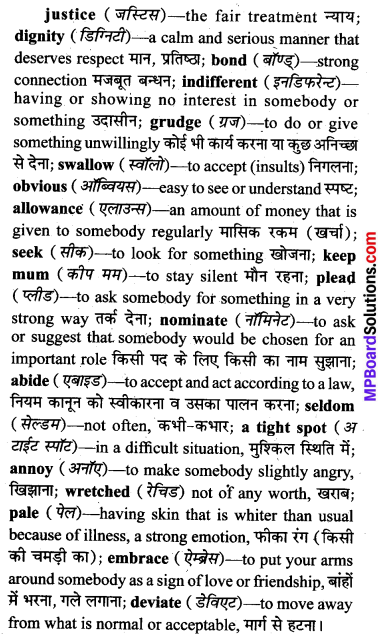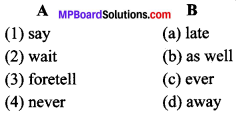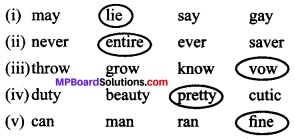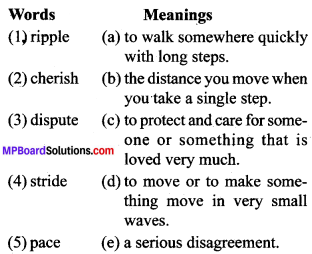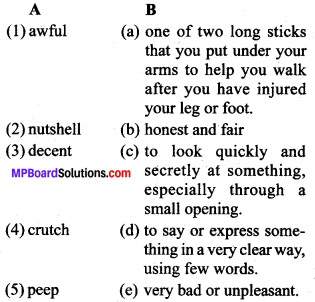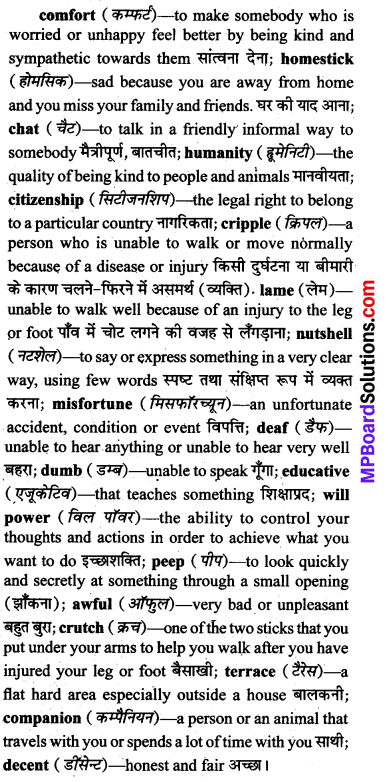Get Updated MP Board Solutions for Class 7 Special English Revision Exercises 3 Questions and Answers in PDF Format and download them free of cost. These are provided as per the latest exam pattern and syllabus. Access the topics of Chapter wise and communication skills, grammer part through the direct links available depending on the need. You can Download MP Board Class 7 English Solutions and can score highest grade in examination. Clear all your queries on the Mp Board Solutions for Class 7 English Chapter 21 Tansen Questions and Answers Subject by using the Madhya Pradesh State Board Solutions for existing.
MP Board Class 7th Special English Solutions Revision Exercises 3
If you are eager to know about the Madhya Pradesh State Board Solutions for Class 7 English you will find all of them here. You can identify the knowledge gap using these MP Board Solutions for English PDF and plan accordingly. Don’t worry about the accuracy as they are given after extensive research by people having subject knowledge along side from the latest English Syllabus.
Comprehension
Question 1.
How did the rats make the people uncomfortable?
Answer:
The rats ate all grains, flour, bread and cheese. They got into their shoes, hats and pockets. They lay in beds and cradles of children and bit the babies. They attacked and killed kittens and puppies. They confronted dogs and cats. In this way, the rats made the people uncomfortable.
Question 2.
How did the Pied Piper punish the people of Hamelin?
Answer:
The Piper played a different tune. All the children were drawn to the charming tune. They followed the Piper merrily. In this way, the Piper punished the people of Hamelin very severely. He led their children to some unknown place in the side of mountain near the town.
Question 3.
How many slaves were employed in building the great Pyramid?
Answer:
A hundred thousand (one lakh) slaves were employed in building the Great Pyramid.
Question 4.
What was ancient Egypt famous for? What was its greatest glory?
Answer:
Ancient Egypt was famous for its art and civilization. Its greatest glory was its pyramids.
Question 5.
What does hieroglyphics mean?
Answer:
Hieroglyphics means ‘sacred writing.’ It is a kind of picture writing.
Question 6.
Where did Radha carry her curds to?
Answer:
Radha carried her curds to the Mathura fair.
Question 7.
Why did Akbar punish Tansen’s enemies?
Answer:
Tansen’s enemies wanted to ruin him. Akbar came to know about their conspiracy. Therefore, he punished Tansen’s enemies.
Question 8.
How did Tansen come into contact with Swami Haridas?
Answer:
Tansen used to go to dense forests to enjoy the beauty of nature. He learnt how to imitate the calls of different birds and animals, One day, swami Haridas and his disciples were crossing the forest. Tansen roared like a lion. It frightened Swami Haridas and his disiciples. One of the disciples found Tansen and presented him before Swamiji. Thus Tansen came into contact with Swami Haridas.
Question 9.
What is an alphabet? How is it better system than picture writing?
Answer:
An alphabet is a collection of letters. Each letter stands for a sound of the language. The letters are learnt in a fixed order. Instead of drawing pictures of objects we talk about, this system of writing represents the sounds we use in our speech. As the sounds of any one language are not many, we need not have a large number of symbols. In most languages the letters of the alphabet are never more than fifty. But we can form several hundreds or thousands of words by combining letters. The alphabetic system of writing is therefore far better than picture writing.
Question 10.
Why did the pied Piper look very strange?
Answer:
The Piper looked very strange on account of his red and yellow dress and odd appearance. He was dressed in red and yellow. He was as thin as a starved rat. He had a crooked nose and bright, blue eyes. He had no beard and a smile played on his lips.
Word Power
A. Encircle the odd one:
- Diwali, Id, Monday, Holi.
- flours, wheat, bread, vegetable.
- dollar, pound, rupee, cheque.
- girl, lady, man, woman.
- lecturer, professor, teacher, postman.
Answer:
- Monday
- Vegetable
- Cheque
- Man
- Postman.
B. Find the opposites of the words listed below from the words given in the box and write them
(possible, life, ancient, wise, difficult)
- Modern …………
- easy ………..
- impossible ………..
- fool …………
- death ………..
Answer:
- ancient
- difficult
- possible
- wise
- life
Grammar in use
A. Punctuate the following lines using ., ,, ‘, ? and capital letters.
does the road uphill go all the way yes to the very end.
will the days journey take the whole long day
from morn to night my friend.
Answer:
Does the road uphill go all the way? Yes, to the very end.
Will the day’s journey take the whole long day
From morn to night, my friend.
B. Fill in the blank spaces with suitable adverb given below:
(logically, very, clearly, highly, easily)
Answer:
Our new English teacher is very sincere. She is highly qualified and explains every thing clearly and logically. All the students understand easily whatever she explains.
Let’s Write
Question 1.
Write a note on the topic : How rats trouble you in the house. Use the following clues:
(nibble, food, wheat, clothes, toys, cats, chasing, them.)
Answer:
How Rates Trouble you in the House:
The rats eat up cooked food and grain like wheat, barley, gram, millet and maize. They nibble our clothes and tear holes in them. They nibble the toys and bite babies, kittens and puppies. They chase cats and dogs.
Question 2.
Describe in your own words the look and the dress of the Pied Piper.
Answer:
The Pied Piper was dressed in red and yellow. He had a pipe in his hand. He was very thin. His nose was crooked. His eyes were sharp and blue. He had no beard. He had smiling lips. He looked very strange.
Question 3.
Write a short account of the great Pyramid
Hints:
who built it and why? time taken to build it. number of slaves employed Its base, height and its faces A wonder of the world
Answer:
The great Pyramid was built by Cheops, the most famous King of Egypt about four thousand years ago. It took twenty years to build this Great Pyramid. One hundred thousand slaves were engaged to build it. It stands on a base of more than twelve acres of land. Its height is 500 feet. Its faces are very smooth. About two and a half million blocks of stone were used for it. Each block weighed about two and a half tons. It is very solidly built. There is no room even for a single hair to be slipped in between any two blocks of stones. This everlasting pyramid is the glory of Egypt and remains a wonder of the world to this day.
Question 4.
Write Tansen’s biography in about ten sentences using information from the lesson.
- Birth
- Childhood
- Father
- Guru
- Marriage
- Navrattan
- conspiracy
- deepak Raga
- death
- pilgrimage
Answer:
Tansen’s Biography, Tansen was born at Behat, a small village near Gwalior. He was the only child of his parents. He was a naughty but a talented and adventurous child. Sri Mukandan Misra was his father. Swami Haridas was his guru. Tansen was married to hussaini. Tansen joined Akbar’s courts as one of his ‘Navartnas’ He sang the Raga. Deepak properly and successfully. His daughter and her friend saved his life by singing Raga Mesh. However, he fell seriously ill and died in 1585 His tomb at Gwalior is a place of pilgrimage for music lovers.
Question 5.
Write a paragraph on each stanza of the poem:
“Song of Radha” the milk maid explaining what the poetess Sarojini Naidu is trying to say in the poem.
Answer:
Do Yourself.
We believe the information shared regarding MP Board Solutions for Class 7 English Chapter 21 Tansen Questions and Answers as far as our knowledge is concerned is true and reliable. In case of any queries or suggestions do leave us your feedback and our team will guide you at soonest possibility. Bookmark our site to avail latest updates on several state board Solutions at your fingertips.
